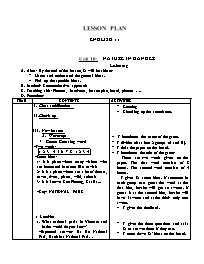Lesson plan - English 11 - Unit 10: Nature in danger

A. Aims: By the end of the lesson, Ss will be able to:
Listen and understand the general ideas.
Pick up the specific ideas.
B. Method: Communicative approach
C. Teaching aids: Pictures, hand-outs, lesson plan, board, picture .
D. Procedure:
Bạn đang xem tài liệu "Lesson plan - English 11 - Unit 10: Nature in danger", để tải tài liệu gốc về máy bạn click vào nút DOWNLOAD ở trên
LESSON PLAN ENGLISH 11 Unit 10: NATURE IN DANGER Listening Aims: By the end of the lesson, Ss will be able to: Listen and understand the general ideas. Pick up the specific ideas. Method: Communicative approach Teaching aids: Pictures, hand-outs, lesson plan, board, picture . Procedure: TIME CONTENTS ACTIVITIES Class stabilization Check up New lesson: Warm-up: Game: Guessing word *Two words: 1 2 3 4 5 6 7 8 1 2 3 4 *Some hints: 1- It is place where many visitors who are interested in nature like to visit 2- It is a place where are a lot of forests, caves, rivers, plants, wild, animals 3- It is known Cuc Phuong, Cat Ba... *Key: NATIONAL PARK Lead-in: What national parks in Vietnam and in the world do you know? *Expected answer: Ba Be National Park, Bach Ma National Park b. Why have many national parks in the world been founded? c. Can you tell me some danger these national parks can face with? Pre-listening: New word: Scenic features (n): Thien nhien xinh dep. Devastating (adj): Thuoc ve su tan pha. An adjective that means causing a lot of damage. Approximately (adv): xap si. another word of nearly or about Vehicles (n): xe co. something like cars, bicycles, lorries, buses Maintenance (n): sù duy tri. Find a word that means keeping something in good condition. While-listening: *Task 1: True or False Statements: Key: 1- National parks protect and preserve the natural beauty of the land, T 2- They usually contain a variety of scenic features, T s 3- All national parks are in danger of being destroyed F. Many national parks, not all national parks 4- Large areas of national parks can be destroyed by fire. T 5- Visitors do not help to preserve and protect national parks, T Greeting Checking up the attendance. T introduces the name of the game. T divides class into 2 groups (A and B). T ticks the paper on the board. T introduces the rule of the game: + There are two words given on the paper. The first word consists of 8 letters. The second word consists of 4 letters. + T gives Ss some hints. If someone in each group can guess the word at the first hint, he/she will get 10 sweets. If guess it at the second hint, he/she will have 5 sweets and at the third- only one sweet. T gives the feedback. T gives the three questions and asks Ss to answer them if they can. T notes down Ss' ideas on the board. T introduces the new lesson:” Today you're going to listen to a text about national parks in the United States”. Teacher writes the title of the lesson. +Teacher shows the new words on the paper. + T shows the meaning of the word in Vietnamese. + Teacher speaks out the word loudly as a model. + Teacher gets students to repeat in chorus and individually. T reads the instruction in task1 and instructs Ss to read the statements carefully and asks Ss to underline : Key words, → Information to easily mislead T asks Ss to listen to the text twice and check their predictions. Ask Ss to compare their answers then call them out. If it is false, say why T calls some Ss to give their answers and to explain. T asks Ss to listen again and gives the feedback. *Task2: Answer the question: Key: There are 52 national parks in the United State. Millions of people visit national parks every year. Rare animals are killed or hunted for fur, skin or other parts. Trees are cutting down for wood. Large areas of national parks experience devastating fires caused by careless people. The increasing number of visitors is harming the parks due to the pollution from their vehicles. Rare animals and trees should be protected, fires caused by careless people should be limited, pollution from visitors’ vehicles should be decreased and money should be raised for the parks’ staff and maintenance of their resources. Post-listening: Discussion these questions: Have you ever visited a national park in our country? Or have you ever seen a national park in Vietnam on TV? What is there in the National park? Does it have the same problems as the other national parks? What should we do to protect as the other national parks? What shouldn't we do to destroy them? HOMEWORK: T writes summary of the text. Prepare for the next lesson: unit10, writing. T reads the instruction in task1 and asks Ss to give the key word in each question. T asks Ss to listen again and to answer the questions in the textbook. T checks and gives the feedback. T gives the handout for Ss. T introduces how to do this task. T divided Ss in groups of 5 to discuss these questions base on the information in task 1 and task 2. T calls the representative of each group to report their ideas in front of class. T gives the comment. T summarizes the whole the content of the lesson. Students take notes and do their homework.
Tài liệu đính kèm:
 unit10-english11-listening.doc
unit10-english11-listening.doc





